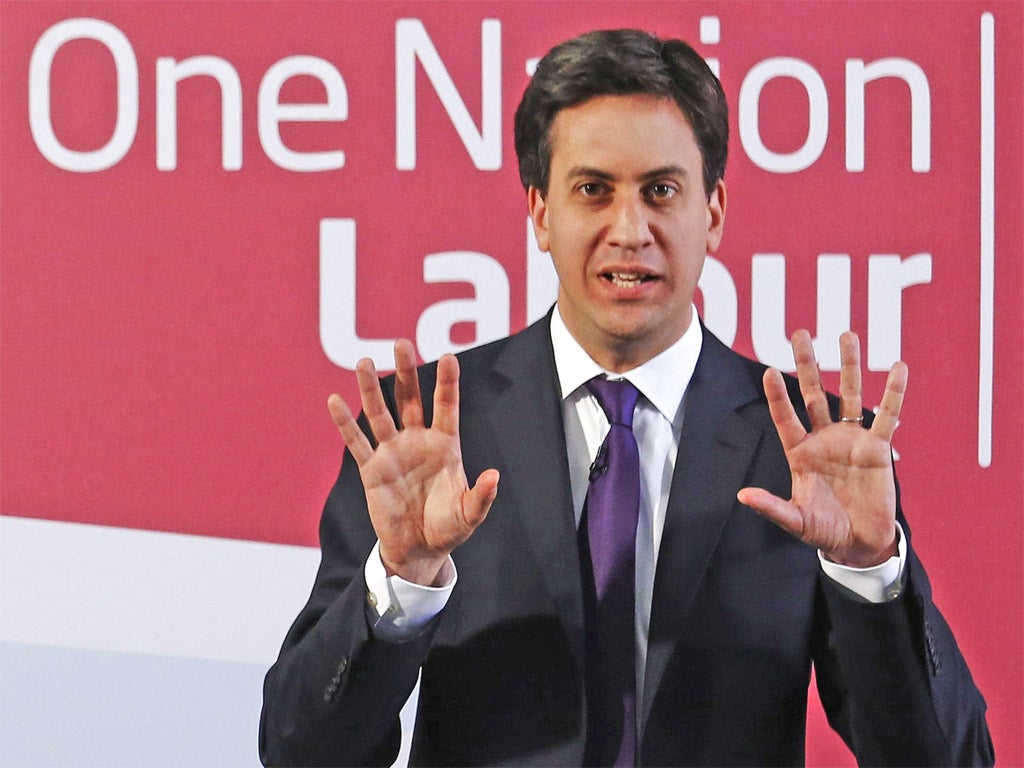Reform way donations are made or we reject them, Ed Miliband warns trade unions
Labour leader outlined 'massive change' to relationship between party and its main financial backers

Your support helps us to tell the story
From reproductive rights to climate change to Big Tech, The Independent is on the ground when the story is developing. Whether it's investigating the financials of Elon Musk's pro-Trump PAC or producing our latest documentary, 'The A Word', which shines a light on the American women fighting for reproductive rights, we know how important it is to parse out the facts from the messaging.
At such a critical moment in US history, we need reporters on the ground. Your donation allows us to keep sending journalists to speak to both sides of the story.
The Independent is trusted by Americans across the entire political spectrum. And unlike many other quality news outlets, we choose not to lock Americans out of our reporting and analysis with paywalls. We believe quality journalism should be available to everyone, paid for by those who can afford it.
Your support makes all the difference.Labour will refuse to accept money from individual trade unions unless they reform the way it is given, Ed Miliband warned today.
The Labour leader raised the stakes as he outlined what he called a "massive change" to the relationship between the party and its main financial backers. He said he was determined to "seize the moment" created by the row over alleged malpractice by the Unite in trying to install its favoured candidate as Labour's standard-bearer in Falkirk at the 2015 election.
Mr Miliband wants to implement before the election a change under which union members would "opt in" to paying £3 a year to the party, replacing the present system under which they "opt out" if they do not wish to fund Labour. "No one should be in any doubt about my determination to get this done," he said.
Answering questions after a keynote speech in London, Mr Miliband hinted strongly that Labour would turn down the unions' money unless their affiliation fees, which total £8.2m annually, were collected in the way he proposes. He pointed out that it was "a two-way relationship" in which unions decide whether to affiliate members to the party - and Labour decides whether to accept their money.
However, Tory officials dismissed this threat as empty. They warned that the unions would merely hold back part of the money they now pay in affiliation fees and then hand it over as a separate donation in the run-up to a general election, when unions traditionally give Labour millions of pounds. But Labour aides replied that Mr Miliband supported reforms to funding of all parties including a £10,000 cap on donations, which would include one-off union gifts.
The Labour leader hopes to secure his reform by reaching a consensus with unions. Lord (Ray) Collins, a former party general secretary and ex-Unite official, will head a review. It will also consider the "wider implications," such as the unions' 50 per cent share of the votes at Labour's annual conference and their 33 per cent share in the electoral college which chooses the party leader. Both could be vulnerable in the medium term if the unions persuade only a small proportion of their 3m affiliated members to "opt in" to funding Labour.
Mr Miliband won the backing of Tony Blair, who earlier praised him for what he called "a real act of leadership." The former Prime Minister admitted that he should have made the same reform when he was party leader, saying: "I think this is a defining moment, and I think it's bold and it's strong." Mr Blair said the change was important for Labour but also sent a "very strong message to the country."
Some unions threatened to block the change but Len McCluskey, Unite's leader, adopted a conciliatory tone after a telephone conversation with Mr Miliband. He said: "It was certainly a bold and brave speech, and it may well be a historic one if Ed's vision comes to fruition. He seemed to be saying that he wanted to see tens of thousands, maybe hundreds of thousands, of ordinary trade unionists actively playing an active role within the Labour Party. That's something I very much welcome."
Billy Hayes, general secretary of the CWU postal workers’ union, dismissed the Miliband plan as “a very old fashioned idea.” Asked whether he could stop Mr Miliband pushing through the reforms, he replied: "Well, let's see. Let's just see what happens in the process." He added: "We are going to make sure our voice is heard. We live in a democratic society and as I understand it we are entitled to have our say in the party."
Dave Prentis, leader of Unison, added: “The current debate about the relationship between Labour and the unions, played out so publicly in the media, is an unforgiveable diversion from the real issues that this country faces.”
Join our commenting forum
Join thought-provoking conversations, follow other Independent readers and see their replies
Comments